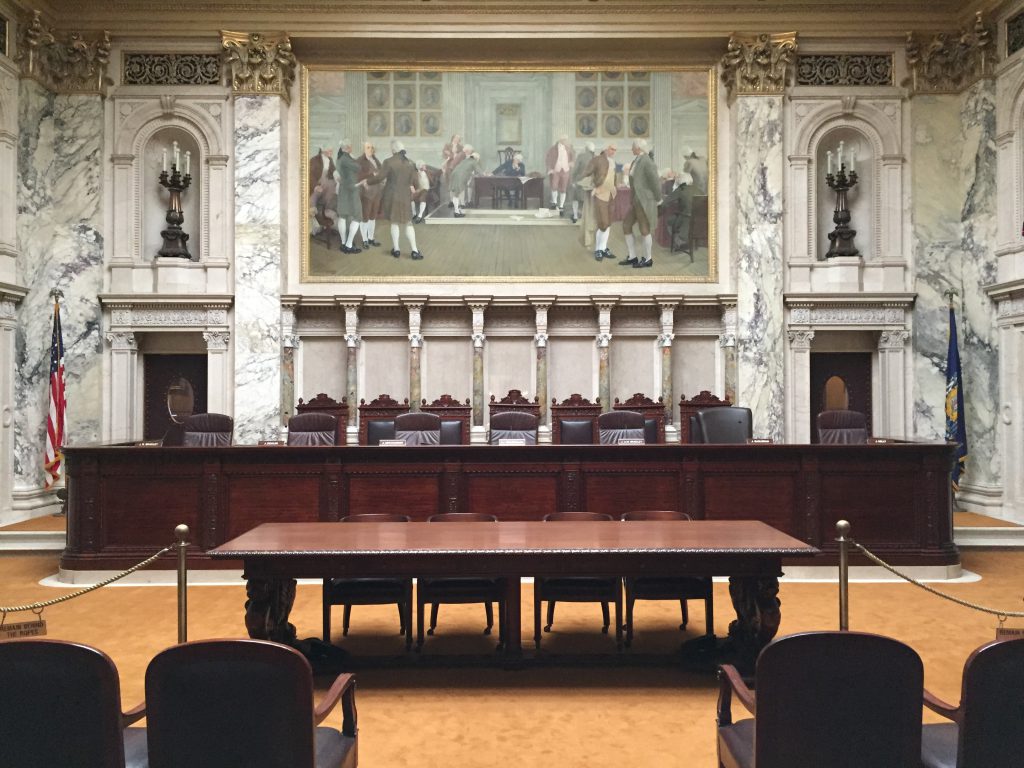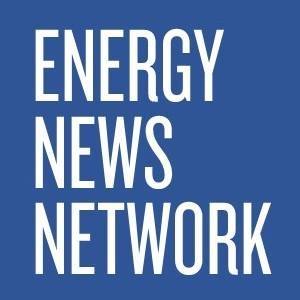Solar Developer Will Fight We Energies
Eagle Point Solar asking state regulators to allow solar project opposed by We Energies.

The Wisconsin Supreme Court courtroom inside the Wisconsin State Capitol building in Madison. Eagle Point solar president Barry Shear says he’s willing to take a dispute over third-party ownership here if necessary. “I’m going to take this to its conclusion,” he said. Photo by Dave Reid.
The standoff between a Wisconsin utility and solar developer intensified last week with a petition filed by Eagle Point Solar asking state regulators to force We Energies to proceed with an interconnection request for its project.
The March 6 filing also asks the Wisconsin Public Service Commission to declare that Eagle Point would not be acting as a public utility in the third-party-owned solar project it was developing with the city of Milwaukee.
Eagle Point president Barry Shear said he sees a long legal battle ahead, possibly ending up in the state Supreme Court as did his fight with a utility in Iowa, where the court ruled in favor of Eagle Point and the concept of third-party ownership.
If the Public Service Commission refuses to open a docket and consider Eagle Point’s request, Shear said he will challenge the decision in state court. If the commission were to open a docket and eventually find in Eagle Point’s favor, Shear predicted an appeal by We Energies.
In January, the commission, which did not return a request for comment, turned down a request from solar developer Sunrun to open a docket exploring the legality of third-party ownership. In his petition, Shear specified that his request is different because it involves one specific case rather than a theoretical situation.
Solar developers, municipalities, nonprofit institutions and solar advocates in Milwaukee have asked the commission and state legislators for clarity on whether third-party ownership is legal, since many seek it as a way for institutions and cities to develop solar without paying steep upfront costs or foregoing tax credits not available to nonprofits. We Energies meanwhile has been seen as hostile to distributed solar generation by its customers and has tried to ban third-party ownership.
“I fully expect We Energies to fight this at every level,” Shear said. “They will probably get collaborators in the utility universe to oppose it, since they don’t want their revenue base diluted. If the utilities prevail or the Public Service Commission doesn’t take this up, I’m going to take it to court because I think on the law we are clearly in the right.”
Defining a public utility
The petition notes that under a Solar Services Agreement signed by Eagle Point and Milwaukee, Eagle Point would own 80 percent of six different solar installations on city property, and the city would own 20 percent, with the option to take full ownership over time. Eagle Point would provide services including financing the upfront costs of the panels, maintaining the panels and passing on the value of tax credits not available to the city since it doesn’t pay federal taxes.
The electricity would only be used on the site where it is generated, a crucial factor in arguing that the company would not be acting as a public utility as We Energies has charged.
Under the agreement, neither Eagle Point nor the city would sell electricity to any third party, nor back to We Energies. The city would pay Eagle Point a fixed charge per month, not based on kilowatts per hour generated, another provision meant to underscore it would not be acting as a utility.
Eagle Point argues in its petition that who owns a distributed generation asset like solar is legally supposed to have no bearing on whether the utility interconnects it to the grid. The interconnection process is meant to ensure the generation can be integrated with the grid without causing problems.
Eagle Point has long said that We Energies knew about the Milwaukee plan for months and raised no concerns, starting with the city’s request for proposals in April 2018, and didn’t object until late in the process, when Eagle Point had already invested about $100,000 in the project and foregone about $400,000 worth of other work, keeping 21 of its 27 installers available.
“Since it was such a compressed time frame I didn’t take on other projects, I couldn’t commit to doing other things,” Shear said. “I got completely kneecapped by We Energies.”
A public utility?
Eagle Point’s petition cites other legal cases to clarify the definition of a public utility.
It notes that the Wisconsin Supreme Court in 1911 decided a landlord who built a steam plant to provide electricity to his tenants and several other buildings was not providing electricity to the public; nor was a power line obtained by a group of neighbors who “voluntarily band[ed] together” in a case decided in 1924.
When Ford Motor Company built a hydropower plant to supply its factory and actually wanted to be considered a public utility, the Wisconsin court disagreed. Ultimately, such case law says that serving a “restricted group” of people does not make something a public utility, Eagle Point’s petition argues.
“You can’t have a public utility under another public utility’s service territory — that’s their rationale” in denying interconnection, Shear said.
“The problem with that is the relevant and directly on-point Supreme Court cases that exist in Wisconsin and elsewhere about what a public utility is. You have to serve all of the public, not just one customer. I don’t meet any of those criteria, but We Energies — with their economic might — think they can say whatever they want to.”
Shrinking plans
At the same time it denied interconnection for the city’s project with Eagle Point, We Energies suggested Milwaukee participate in a new utility pilot project known as Solar Now or “Rent a Roof” wherein the utility would build solar on city facilities and pay a fee to the city.
“We are in regular contact with the city of Milwaukee and, as we have told them, by working with us on our Solar Now and DRER programs they could obtain nearly 40 percent of energy from renewable sources,” Jahns said, calling Solar Now the “largest approved solar program in Wisconsin history.”
“This is specifically the reason why third-party transactions are necessary,” Shear said. “The city would have had this solar array built without any capital outlay, all they would have had to do is buy the clean energy at a direct cost savings and the project would have gone forward.”
Since legal proceedings may take years to resolve, Shear said he’s unsure whether the larger project will ever be built. But he sees his battle with We Energies as important for the future of his company and solar more generally in Wisconsin. He said We Energies’ investment in blocking the project shows its larger importance.
“This is a drop of water in Lake Michigan compared to their total energy ocean, so it’s extraordinary they’d go to these lengths to stop this project,” Shear said. “I’m going to take this to its conclusion because what We Energies did in the city of Milwaukee has chilled and effectively tabled every municipal project we were working on in the state of Wisconsin. No one is willing to go forward until this is determined. We Energies has effectively blocked third-party solar in Wisconsin because of what they did in Milwaukee.”
This story was originally published by the Energy News Network.





















